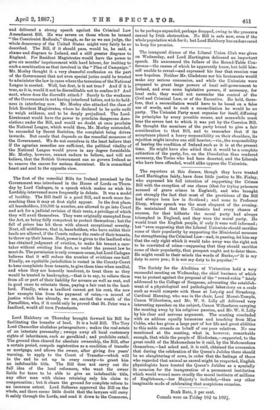The first of the remedial Bills for Ireland promised by
the Government was introduced in the House of Lords on Thurs- day by Lord Cadogan, in a speech which makes us wish his Lordship intervened more frequently in debate. It was a model of lucidity. The Bill itself is a good Bill, and much more far- reaching than it may at first sight appear. In the first place, all leaseholders, 150,000 in number, are allowed to go into Court and ask for a judicial revision of their rents, a privilege of which -they will avail themselves. They were originally exempted from -the Act, as being fully competent to protect themselves ; but the fall of prices has hit them with almost exceptional severity. Next, all middlemen, that is, leaseholders, who have sublet their lands are allowed, if the Courts reduce the rents of their tenants, to throw up their leases. Next, power is given to the landlord who has obtained judgment of eviction, to make his tenant a care- taker without evicting him first, as under the present law he must do. The permission is only common-sense, but Lord Cadogan believes that it will reduce the number of evictions one-half. Finally, an equitable jurisdiction is vested in the County-Court to hear complaints from tenants, to give them time when needful, and when they are honestly insolvent, to treat them as they would be treated in bankruptcy,—that is to say, to relieve them from all or part of their liability for arrears as well as rent, and in good cases to reinstate them, paying a fair rent to the land- lord. Finally, when a landlord cannot get his rent, the new law exempts him from the payment of ratea—a morsel of justice which has already, we see, excited the wrath of the Parnellites, who, if it could only be proved that St. Peter was a landlord, would all turn Protestants.


































 Previous page
Previous page